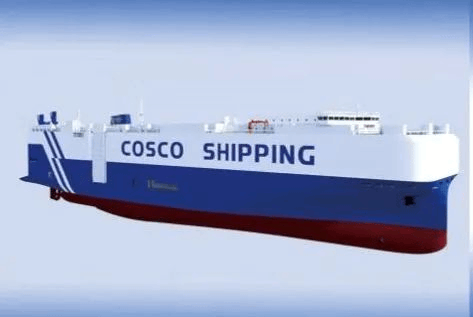
〆Operators of car carriers are forced to operate at a loss due to the detour around the Suez Canal.
Amid a global shortage of car carriers, COSCO Shipping Specialized Carriers, a subsidiary of China COSCO Shipping Corporation, will build 24 new LNG-fueled car carriers by fiscal year 2026. According to sources like Clarkson, there are currently about 750 car carriers in operation worldwide. Between 2020 and 2021, the impact of the coronavirus led to a downturn in the U.S. economy, and orders for new car carriers had ceased.
However, since 2023, the transportation of electric vehicles from China to Europe has revitalized the car carrier industry. Currently, to bypass the Suez Canal, car carriers are rerouting via the Cape of Good Hope in South Africa. This detour adds about 20 days to the round trip compared to passing through the Suez Canal. A major Japanese shipping company states, “Even if we add the increased costs of fuel for the detour to the freight charges, considering the ‘lost profits’ from cargo that could have been transported without the detour, it still results in a loss-making operation.”
A 7,500-car capacity LNG (Liquefied Natural Gas) fueled car carrier, belonging to China COSCO Shipping Corporation, was launched at Xiamen Shipbuilding Heavy Industry in China. COSCO plans to build 24 LNG-fueled car carriers by 2026, with the newly launched vessel being the first of these. COSCO is expanding its car carrier fleet to meet the transport demands of its domestic automakers.
The new vessel is scheduled to be completed in July. Once operational, it will be managed by Guangzhou Yuanhai Car Ship, a joint venture between COSCO Shipping Specialized and Shanghai International Port Group Logistics and SAIC Anji Logistics. The vessel will be leased from Shanghai Bank Financial Leasing. The classification of the vessel is overseen by the American Bureau of Shipping (ABS).
COSCO is constructing 24 dual-fuel car carriers that can run on LNG, a cleaner alternative to the traditional heavy oil used in ships. These vessels have capacities ranging from 7,000 to 8,600 cars. Of the 24 vessels, six are set to be completed in 2024, 11 in 2025, and seven in 2026. The addition of these new vessels will expand COSCO’s car carrier fleet to 30 ships by the end of 2026, increasing its transport capacity to 700,000 cars annually.
In 2023, China’s auto exports surged by 57% year-over-year to 5,221,000 vehicles, making it the world’s largest exporter of automobiles, surpassing Japan. The primary export destinations include Russia, followed by Mexico and Belgium.
Chinese shipping companies are struggling to meet the soaring transport demands from automakers. COSCO is building its car carrier fleet to accommodate the growing transportation needs of shippers.